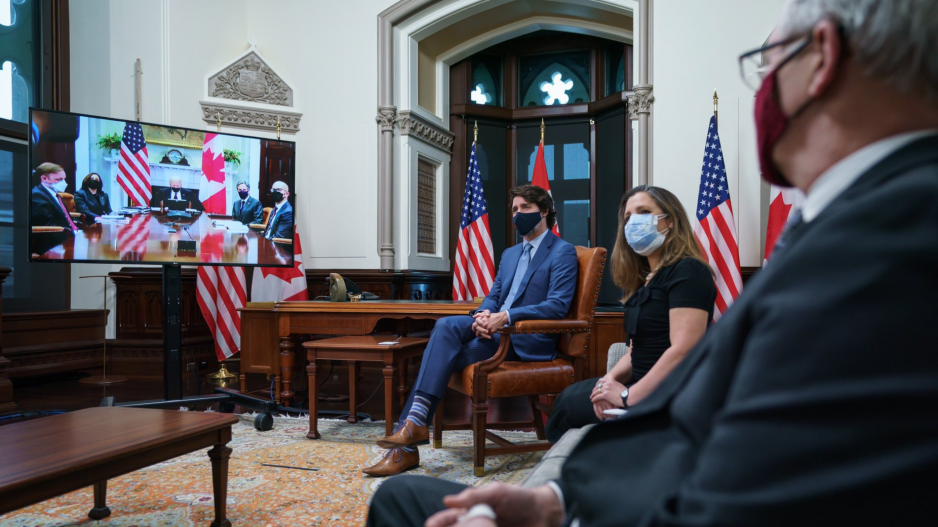Canada and the United States have agreed to “double down” on efforts to tackle climate change, and will work together to ensure the safe return of two Canadians detained in China.
U.S. President Joe Biden and Prime Minister Justin Trudeau held their first bilateral meeting on Tuesday – a discussion that covered COVID-19, economic recovery, strengthening supply chains and North American security.
On climate change, Biden told members of the media that both countries have committed to achieving net-zero emissions by 2050, while Trudeau emphasized their joint commitment to ensuring green economic growth is part of the United States' and Canada's economic recovery.
“Canada and the United States are going to work in lockstep to display the seriousness of our commitment at both home and abroad," Biden said.
He added that the United States will assist Canada in its efforts to free Michael Kovrig and Michael Spavor from detention in China.
“Human beings are not bartering chips. We’re going to work together until we get their safe return,” he said. Ahead of his meeting with Trudeau, Biden noted that he intended to discuss China.
Addressing COVID-19 remains the top priority for both countries. Other immediate priorities include strengthening the World Health Organization to help prevent future global health threats, and preventing the spread of weapons of mass destruction.
Regarding recovery, both Biden and Trudeau acknowledged the importance of ensuring an inclusive economic recovery, and said they would work together to support minority- and female-owned small and medium-sized enterprises.
Canada and the U.S. will also cooperate on strengthening supply chain security and resilience, will re-establish the Cross-Border Crime Forum, will work to modernize the North American Aerospace Defense Command (NORAD) and will launch a dialogue on Arctic defence and security.
Missing from the short remarks made after the meeting was any explicit mention of the cancelled Keystone XL pipeline project. Trudeau did mention that families on both sides of the border rely on the Canada-U.S. partnership – including partnership on energy.
"Canadian energy workers power homes on both sides of the border. It goes to show that we're all better off for this partnership," Trudeau said.
No public mention was made regarding when cross-border travel restrictions may be lifted.
The bilateral discussion took place virtually, without the pomp and circumstance that would have typically accompanied a first formal meeting, pre-pandemic.
The meeting included Deputy Prime Minister Chrystia Freeland and Minister of Foreign Affairs Marc Garneau. Both also participated in an expanded follow-up discussion with Biden, Trudeau, U.S. Vice-President Kamala Harris and other top government officials.
“Our channels of communication are wide open,” Biden said in brief remarks that preceded the meeting.
Trudeau thanked Biden for “stepping up in such a big way” on the issue of climate change.
“U.S. leadership has been sorely missed over the past years,” he said.
According to Ottawa, the bilateral conversation also covered job creation, expanding the middle class and the promotion of diversity and inclusion.




